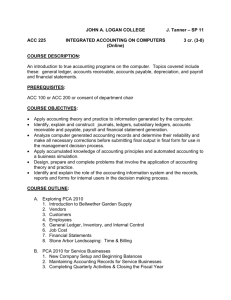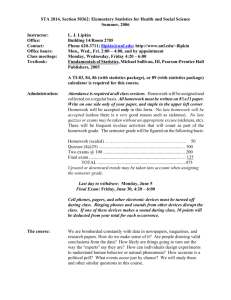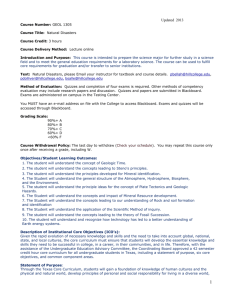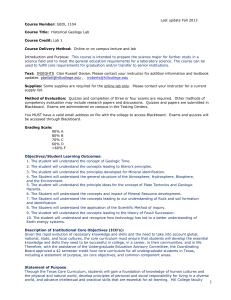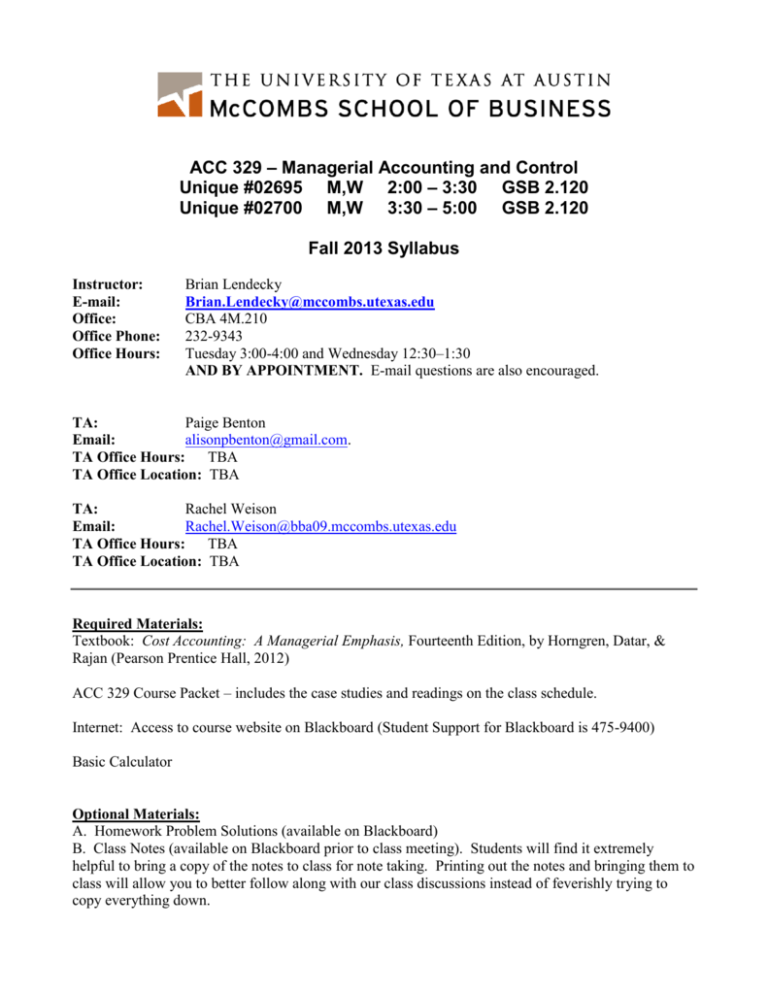
ACC 329 – Managerial Accounting and Control
Unique #02695 M,W 2:00 – 3:30 GSB 2.120
Unique #02700 M,W 3:30 – 5:00 GSB 2.120
Fall 2013 Syllabus
Instructor:
E-mail:
Office:
Office Phone:
Office Hours:
Brian Lendecky
Brian.Lendecky@mccombs.utexas.edu
CBA 4M.210
232-9343
Tuesday 3:00-4:00 and Wednesday 12:30–1:30
AND BY APPOINTMENT. E-mail questions are also encouraged.
TA:
Paige Benton
Email:
alisonpbenton@gmail.com.
TA Office Hours: TBA
TA Office Location: TBA
TA:
Rachel Weison
Email:
Rachel.Weison@bba09.mccombs.utexas.edu
TA Office Hours: TBA
TA Office Location: TBA
Required Materials:
Textbook: Cost Accounting: A Managerial Emphasis, Fourteenth Edition, by Horngren, Datar, &
Rajan (Pearson Prentice Hall, 2012)
ACC 329 Course Packet – includes the case studies and readings on the class schedule.
Internet: Access to course website on Blackboard (Student Support for Blackboard is 475-9400)
Basic Calculator
Optional Materials:
A. Homework Problem Solutions (available on Blackboard)
B. Class Notes (available on Blackboard prior to class meeting). Students will find it extremely
helpful to bring a copy of the notes to class for note taking. Printing out the notes and bringing them to
class will allow you to better follow along with our class discussions instead of feverishly trying to
copy everything down.
Objectives of the course:
Any organization’s long-term competitive success is critically dependent on (1) its ability to
appropriately organize and analyze high-quality information about its products, services, processes,
organizational units, suppliers, and customers that fits its decision needs, (2) its ability to act rationally
on that information, and (3) its ability to control its performance consistent with that information. The
term managerial accounting refers to the set of information concepts, models, and systems that provide
this information and control for managers. The main objectives are to:
- Understand how to analyze cost information to support decisions that are essential for longterm success in a company’s competitive environment.
- Comprehend the conceptual bases for long-run and short-run managerial decision and
determine what information is relevant to those decisions.
- Consider the traditional tools and modern methods of management control and the use and
analysis of managerial accounting information to support control
Managerial accountants are not only concerned with how cost data are transformed in to accounting
information but more importantly how to use accounting information to aid managerial goals. The
course should develop the student’s understanding, skill, and analytic ability in management
accounting to the level where he or she can function effectively and efficiently as a professional
management accountant in industry, public accounting, management consulting, government, or in
personal business management.
Prerequisites:
Restricted to students in a business major. Only one of the following may be counted: Business
Administration 380E, 382T, Accounting 329, 359, 387 (Topic 1: Introduction to Managerial
Accounting), 287 (Topic 5: Performance Management and Control).
Prerequisite: Accounting 311 or 311H, and 312 or 312H, with a grade of at least C- in each.
Be certain you meet these requirements or you will be dropped from the course. If you do not satisfy
these prerequisites you should drop ACC 329 or the Office of the Dean of Undergraduate Programs
will drop you from the course. Instructors may not waive prerequisites to their courses.
Course Routine:
The course will be conducted with the expectation of students to participate in class discussions, both
for clarification of points discussed in class and to understand how a particular topic relates to their
personal interest in business. Students are expected to study the chapter readings, articles, and
cases in depth PRIOR TO each class meeting. Assigned homework problems are expected to be
completed shortly after class (preferably that night) to reinforce what students have learned.
Students are encouraged to ask questions and to request that particular points be explained in more
detail if they remain confused or uncertain about items discussed or if concepts in the textbook,
readings, or case studies remain unclear.
Tips for Success: Copies of class notes will be posted to Blackboard prior to each class meeting.
Students will find it extremely helpful to bring a copy of the notes to class for note taking.
Grading and Academic Standards:
A high academic level will be maintained with respect to (a) quality of the course and (b) grading.
Semester grades will be determined using the following factors and relative weights:
Lowest Midterm
Highest Midterm
Final Exam
Quizzes
Total
22%
28%
30%
20%
100%
I have adopted the University’s plus/minus grading as the standard for all sections of the course. I
believe that plus/minus grading permits me to better distinguish gradations in performance and
provides better feedback to students on their performance.
Note - under the plus/minus grading system an undergraduate student needs a D- or better to receive
credit for a class.
The grade you earn is performance based on the items listed above. To determine final grades I rank
all of the students in the class from highest to lowest on the basis of total points. I then draw lines
between A and A- and between A- and B+, etc.
No letter grades will be associated with scores on exams, quizzes, case studies, in-class exercises, etc.
during the semester. You may roughly assess your performance during the semester based on the
traditional grade cutoffs of 90% = A-, 80% = B-, 70% = C-, 60% = D-, and below 60% = F. At the
end of the semester, I will calculate composite scores and assign grades in accordance with the
guidelines and grading standards for the course. However, I reserve the right to adjust the final
composite grades based on the class average and in accordance with the guidelines and grading
standards for the course.
Incompletes will be given only in the RAREST of circumstances and according to university policy.
There will be no opportunity to raise your course grade by doing “extra credit” work after the end of,
or during, the semester. That would violate University policy.
Examinations, In-class exercises, Quizzes, and Case Studies:
Exams: As indicated in the attached Class Schedule, there will be two mid-term exams in this course,
plus a comprehensive final exam.
Alternate exams. Permission to take an alternate exam for a midterm or the final is at my discretion
and the request must be made at least 72 hours in advance.
Unexcused absence from a mid-term exam or the final exam will result in a score of zero. Makeup exams will not be given except in emergencies and only within 24 hours of the scheduled
examination. If you miss an exam for an illness or other emergency reason, you should notify me as
soon as possible and present written documentation (e.g., note from attending physician). I have final
authority to determine if your absence is excused and if I can give you a make-up exam. If you have
an excused absence from a mid-term exam and I cannot give you a make-up, your final exam will
receive extra weight to compensate for the missed mid-term exam.
The Final Exam will be uniform (both sections at the same time) and comprehensive (covering the
entire course). It will NOT be given on the dates and times listed in the UT course schedule. The
actual date and time will be announced later in the semester
If you need to make early travel reservations for the end of the semester, you should make them for
travel on December 18th or later—because we will not know until well into the semester exactly when
our examination will be scheduled by the University. If you make non-refundable (or non-cancelable)
arrangements for travel before December 18th they will not be an acceptable reason for taking the final
exam early.
Quizzes
Quizzes, Case Studies, and In-Class Exercises make up 20% of your semester grade. Some might be
“double-weighted”, which would count as two quiz grades. There might be a quiz, based on
attendance, for a possible Company Field Trip which might be “triple-weighted”. A research paper
may be substituted for attendance at a possible Company Field Trip at my discretion.
If we have 9 quiz grades or less, I will drop the lowest quiz grade. If we have 10 quiz grades or more,
I will drop the lowest two quiz grades.
Throughout the semester there may be quizzes that will usually be completed in the first 5-10 minutes
of class. There will be no make-up quizzes. If you miss a quiz, your grade will be zero. If you are
running late for class and arrive after I have collected the quizzes, your grade will be zero. You will
not be able to take the quiz at the end of class. If you are absent from the class or leave class after
taking the quiz but before the end of class, I reserve the right to discard any quizzes for students not in
attendance for the entire class period. If a quiz is “double-weighted” it will be announced in class
before the quiz is handed out.
It is also possible a quiz might be a take-home assignment. It is possible that a quiz might be a group
assignment, in or out of class.
You must come to the class section you are officially registered in to receive credit for any quiz.
Grading Questions or Appeals:
If you feel there exists a grading error on any of the above grade components, or if you feel you need
to bring to my attention other facts or circumstances that might affect the grade for that item, you will
have one week from the date the item is graded to take such action and have the matter resolved. The
one-week period will begin on the day the grade is posted on Blackboard or the assignment is handed
back (even if you are not in attendance that day), whichever comes first.
DO NOT WAIT UNTIL THE END OF THE SEMESTER, ONCE YOU REALIZE YOU MAY
NEED ADDITIONAL POINTS, TO TAKE THIS ACTION. IT WILL BE TOO LATE!
Homework:
I have listed recommended homework questions from the textbook for each chapter we will cover at
the end of this syllabus and have posted the solutions on Blackboard. Homework should be used to
prepare for class and exams. Students must be able to solve these recommended questions in order to
understand the material and do well on exams. This phase of your study is intended to be a learning
experience rather than a grading device. Working with fellow students is encouraged. You will NOT
turn in homework assigned from the book.
Your E-mail and Blackboard:
Additional readings and study materials, if any, will be posted on Blackboard. It is your obligation,
during the first week of class, to ensure that you can access the class site on Blackboard.
The use of e-mail and blackboard is required for this course. When sending class-wide e-mails, I will
use the e-mail addresses that are supplied to me on Blackboard. However, any individual e-mails I
send to you will be done via Outlook and those e-mail addresses are all McCombs addresses.
Any outside-of-class announcements that I make (e.g., corrections or clarifications of items discussed
in class, syllabus changes, class schedule changes, assignment changes, etc.) will be sent to you via email. It is possible that substantial content will be posted on Blackboard or sent via e-mail. It is your
responsibility to regularly check your e-mail (both your McCombs account and any other accounts that
you might have set up for forwarding) and the class Blackboard site.
E-mail is also a great way to ask me questions that you may have at times other than office hours.
Class Protocol
- Due to abuse by those who came before you, I regret to announce there is a NO LAPTOP policy in
my classroom.
- If for some reason you are running late, do not feel you should skip class. Please come in quietly
and take a seat. If you must leave class early, please tell me before class starts. I would appreciate it.
- Please be sure your cell phones are off before class begins and do not answer calls or send text
messages during class.
- If you need to miss a class or other required activity, including an examination, for any reason,
please inform me as far in advance of the absence as possible, so that I can approve the absence as
excused, if appropriate, and arrangements can be made to complete any missed work within a
reasonable time after the absence. If you miss a class or other required activity, including an
examination, for reasons beyond your control, precluding prior notice, inform me of the circumstances
as soon as you are able.
Dropping the Course:
Students must go through the official procedures to drop the course. A student who stops attending the
class and fails to officially drop will receive a grade of F. Consult the Academic Calendar on the
Registrar’s website (http://www.utexas.edu/student/registrar) for specific deadlines.
Office Hours:
I have regularly scheduled office hours for consultation on matters pertaining to the course. Students
are encouraged to take advantage of these hours to discuss their problems and to secure assistance
where needed throughout the semester. An appointment for office hours outside of the regularly
scheduled times can be made.
Policy on Scholastic Dishonesty:
The McCombs School of Business has no tolerance for acts of scholastic dishonesty. The responsibilities of both
students and faculty with regard to scholastic dishonesty are described in detail in the BBA Program’s
Statement on Scholastic Dishonesty at http://www.mccombs.utexas.edu/BBA/Code-of-Ethics.aspx. By teaching
this course, I have agreed to observe all faculty responsibilities described in that document. By enrolling in this
class, you have agreed to observe all student responsibilities described in that document. If the application of
the Statement on Scholastic Dishonesty to this class or its assignments is unclear in any way, it is your
responsibility to ask me for clarification. Students who violate University rules on scholastic dishonesty are
subject to disciplinary penalties, including the possibility of failure in the course and/or dismissal from the
University. Since dishonesty harms the individual, all students, the integrity of the University, and the value of
our academic brand, policies on scholastic dishonesty will be strictly enforced. You should refer to the Student
Judicial Services website at http://deanofstudents.utexas.edu/sjs/ to access the official University policies and
procedures on scholastic dishonesty as well as further elaboration on what constitutes scholastic dishonesty.
Scholastic dishonesty includes, but is not limited to: copying test or assignments, representing
(copying) the work of another person as one’s own or allowing another person to represent your work
as their own, collaborating without authority with another student during an exam or in preparing
academic work, using or having on your desk unauthorized material or aids to complete a quiz, group
exercise, or exam (e.g., cheat sheets, solutions, graphing or programmable calculators, cell phones,
etc.).
Specific acts of scholastic dishonesty I have reported students to Judicial Services for (and some have
ultimately been expelled for) include:
- after an exam has been graded and returned, erasing a wrong answer on a scantron or written longproblem, writing the correct answer, and then bringing it to my office to appeal that the exam was
graded wrong. (FYI – we hire students workers who make copies of tests before we pass them back.)
- while taking a quiz, looking at your neighbor’s quiz.
- while taking a quiz, allowing your neighbor to look at your quiz (see the underlined and bolded
sentence in the paragraph above)
Religious Holy Days
You will be given excused absences for observance of religious holy days. By UT Austin policy, you must notify
me of your pending absence at least fourteen days prior to the date of observance of a religious holy day. If you
must miss a class, an examination, a work assignment, or a project in order to observe a religious holy day, you
will be given an opportunity to complete the missed work within a reasonable time after the absence. If more
than two days lapse between an exam and your return, the missed exam may be dropped as a requirement for
you. Missed quizzes usually will not be made up, but will be dropped in determining your quiz score.
Students with Disabilities
Students with disabilities may request appropriate academic accommodations from the Division of Diversity
and Community Engagement, Services for Students with Disabilities, 512-471-6259,
http://www.utexas.edu/diversity/ddce/ssd/.
Electronic Class Rosters
A recent opinion from the US Department of Education states that the University must inform students
in advance if their name will be appearing on an electronic class roster: Since Fall 2001, web-based,
password-protected class sites have been available for all accredited courses taught at The University.
Class e-mail rosters are a component of the sites. Students who do not want their names included in
these electronic class rosters must restrict their directory information in the Office of the Registrar,
Main Building, Room 1. For information on restricting directory information see:
http://www.utexas.edu/student/registrar/catalogs/gi00-01/app/appc09.html
Campus Safety
Please note the following recommendations regarding emergency evacuation from the Office of
Campus Safety and Security, 512-471-5767, http://www.utexas.edu/safety/ :
o Occupants of buildings on The University of Texas at Austin campus are required to evacuate
buildings when a fire alarm is activated. Alarm activation or announcement requires exiting
and assembling outside.
o Familiarize yourself with all exit doors of each classroom and building you may occupy.
Remember that the nearest exit door may not be the one you used when entering the building.
o Students requiring assistance in evacuation should inform their instructor in writing during the
first week of class.
o In the event of an evacuation, follow the instruction of faculty or class instructors.
o Do not re-enter a building unless given instructions by the following: Austin Fire Department,
the University of Texas at Austin Police Department, or Fire Prevention Services office.
o Behavior Concerns Advice Line (BCAL): 512-232-5050
o
Further information regarding emergency evacuation routes and emergency procedures
can be found at: www.utexas.edu/emergency.
ACC 329 – Fall 2013 – Class Schedule
Date
Day
Chapter, Topic, Readings, and Homework
8/28
W
Introduction, Course Policies, Syllabus
9/2
M
No Class – Labor Day
9/4
W
Chapter 1 – Introduction
Chapter 2 – Cost Terms
Chapter 3 – CVP Analysis
Textbook Homework – Chapter 1 #1, 2, 3, 4, 6, 8, 9, 14, 25 (part 1 only); Chapter 2 #115, 17, 23, 27 (parts 2&3 only), 28, 32, 33, 36; Chapter 3 #1, 2, 4, 8, 10-14, 28 (parts
1&2 only), 34, 36, 38, 40 (parts 1-3 only), 45
9/9
M
Chapter 4 – Job Costing
Reading – “Supply Chain for iPhone Highlights Costs in China” NYT, by Barboza
Reading – “How Airlines Spend Your Airfare” WSJ, by McCartney
Textbook Homework – 1-4, 6, 8-14, 18, 20, 26, 34, 38
9/11
W
Chapter 9 (and Appendix) – Inventory Costing and Capacity Analysis
Textbook Homework – 1-12, 18, 22, 23, 25, 26, 29, 32, 39
9/16
M
Chapter 9 (and Appendix) – Inventory Costing and Capacity Analysis
9/18
W
Case – Bridgeton Industries: Automotive Component & Fabrication Plant
9/23
M
Chapter 6 (and Appendix) – Master Budget and Responsibility Accounting
Case – Citibank Indonesia
Textbook Homework – 1-9, 11, 13, 14, 15, 28, 30, 36
9/25
W
Case – Citibank Indonesia
Reading – “Games Managers Play at Budget Time” by Steele and Albright
9/30
M
Case – Hanson Ski Products
10/2
W
Catch-up and Review
10/7
M
Exam 1 – Part I
10/9
W
Exam 1 – Part II
10/14 M
Chapter 7 – Flexible Budgets and Direct-Cost Variances (we will cover appendix later)
Textbook Homework – 1-6, 8-13, 15, 26, 27 (skip the part that says “summarize how
these journal entries differ from the normal-costing entries…), 28, 34, 36, 37
10/16 W
Chapter 7 – Flexible Budgets and Direct-Cost Variances (we will cover appendix later)
10/21 M
Chapter 7 – Flexible Budgets and Direct-Cost Variances (we will cover appendix later)
10/23 W
Chapter 8 – Flexible Budgets and Overhead Cost Variances (p.262 - top page 278 only)
Textbook Homework – 1-10, 12, 13, 18, 19, 21, 23, 40 (requirement 2 only)
10/28 M
Chapter 14 – Customer Profitability & Sales-Variance Analysis (pages 514-523 only)
Chapter 7 Appendix
Reading – “Will This Customer Sink Your Stock” by Selden & Colvin
Reading – “Minding the Store: Analyzing Customers, Best Buy Decides Not All Are
Welcome…” by McWilliams
Textbook Homework – 8, 10, 13, 14, 21, 32, 33, 34
10/30 W
Chapter 5 – Activity-Based Costing
Case – Owens and Minor
Textbook Homework – 1-15, 16, 21, 28, 33, 34, 38
11/4
M
No Class
11/6
W
Chapter 13 – Balanced Scorecard (page 466 – top of page 478 only)
Chapter 22 – Management Control Systems (page 774 – 780 only)
Reading – “The Balanced Scorecard – Measures That Drive Performance” by Kaplan
and Norton
Textbook Homework – Chapter 13 #1-6, 8, 9, 18, 34, 36
Textbook Homework – Chapter 22 #1-15, 25, 26, 28, 29
11/11 M
Case – Citibank: Performance Evaluation
11/13 W
Catch-up and Review
11/18 M
Exam II – Part I
11/20 W
Exam II – Part II
11/25 M
Reading – “Control in an Age of Empowerment” by Simons
Case – Automation Consulting Services
11/27 W
No Class – Thanksgiving
12/2
M
Case – Automation Consulting Services
12/4
W
If we have a Company Field Trip – No Class
If we don’t have a company field trip – Automation Consulting Services
12/6
F
Company Field Trip
Final Exam – TBD. Both sections will be taking our Final Exam together at the same time. We
will NOT be taking the final exam at the date and time listed on the Registrar’s website.
Due to the tentative scheduling of a possible company field trip and other matters, this class schedule is
subject to change.

